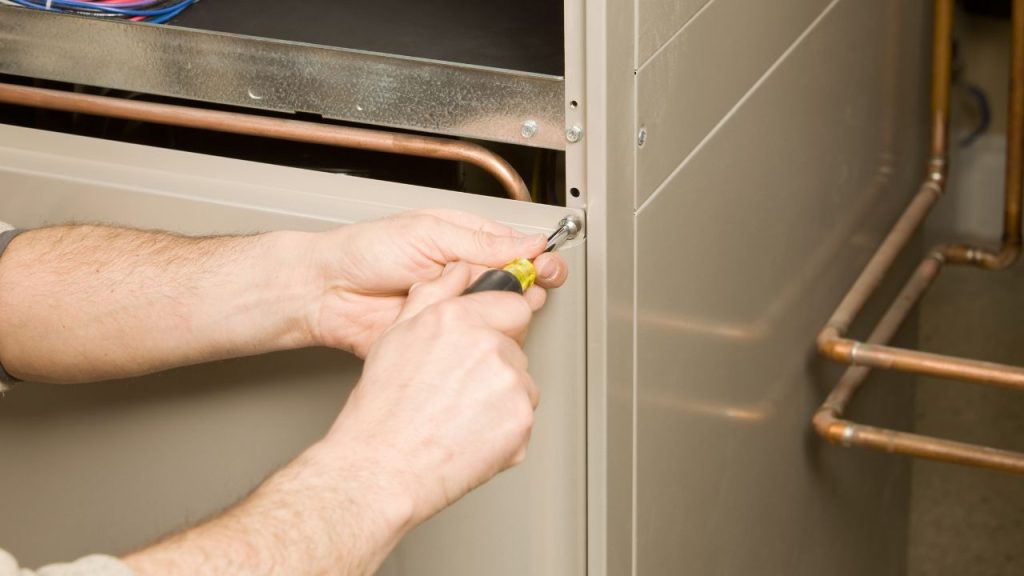Table of Contents
Top Furnace Service Providers in Wilmington, NC: A Comparative Analysis
When winter hits Wilmington, NC, a reliable furnace service provider becomes essential for homeowners. With numerous options available, understanding the key players in the local market can significantly impact the comfort of your home. Below is a comparative analysis of the top furnace service providers in Wilmington, focusing on their offerings, expertise, and customer satisfaction.
Service Providers Overview
Here’s a detailed look at some of the leading furnace service providers in Wilmington, NC:
| Provider Name | Services Offered | Expertise Level | Customer Ratings | Website |
|---|---|---|---|---|
| Comfort Solutions | Furnace installation, repair, maintenance | 15 years | 4.8/5 | comfortsolutions.com |
| Wilmington Heating & Air | 24/7 emergency service, furnace tune-ups | 10 years | 4.7/5 | wilmingtonheatingandair.com |
| Hometown Heating | Energy-efficient furnace options, repairs | 20 years | 4.9/5 | hometownheating.com |
| AirMedix | Furnace maintenance contracts, system upgrades | 12 years | 4.6/5 | airmedix.com |
Key Features to Look For
Selecting the right furnace service provider requires considering multiple aspects to ensure you make an informed choice. Here are some essential factors:
- Experience: Look for companies with years of practical experience in the industry.
- Certifications: Ensure technicians are certified and trained to handle various furnace brands.
- Customer Reviews: Online ratings can offer insight into customer satisfaction and service quality.
- Range of Services: Providers that offer comprehensive services, from installation to maintenance, can save you time and hassle.
- Emergency Services: Having a company that provides 24/7 support can be crucial during unexpected breakdowns.
Comfort Solutions
With over 15 years of experience, Comfort Solutions stands out for its commitment to customer service. They offer a variety of furnace services including repairs, maintenance, and installations of energy-efficient models. Customers praise them for their prompt service and knowledgeable staff, boasting a 4.8/5 rating based on customer feedback.
Wilmington Heating & Air
Wilmington Heating & Air provides around-the-clock emergency service, ensuring your home stays warm no matter the time of day. With over ten years of experience and a strong focus on energy efficiency, it remains a favorite among local residents. Their customer rating is 4.7/5, reflecting their reliable service and professional approach.
Hometown Heating
Another strong contender is Hometown Heating, which has been servicing the Wilmington area for 20 years. They specialize in repairs and energy-efficient systems that help homeowners save money over time. Their customers love them, reflected in their impressive 4.9/5 rating.
AirMedix
For those looking for maintenance contracts and system upgrades, AirMedix is an excellent choice. With over 12 years of expertise and focused service options, they maintain a solid 4.6/5 customer rating, thanks to their timely responses and effective solutions.
Final Thoughts
While selecting a furnace service provider in Wilmington, NC, homeowners should emphasize reliability, service diversity, and customer satisfaction. By considering the options listed above, you can find a suitable provider that meets your furnace service needs effectively. Be sure to reach out for quotes and assess service offerings to make the best choice for your home heating solutions.
Essential Maintenance Tips for Home Furnaces
Maintaining your home furnace is crucial for ensuring it operates efficiently and lasts for years. Regular care not only enhances its performance but also promotes safety and reduces energy costs. Here are some essential maintenance tips to keep your furnace in top shape.
Regular Inspections
Start with a yearly inspection of your furnace. It’s best to have a professional technician check it before the heating season begins. Consider scheduling your check-up in the fall to ensure everything is in working order when you need it the most. During an inspection, technicians will:
- Inspect the heat exchanger for signs of wear or cracks.
- Check burners and ignition systems.
- Inspect the blower and motor.
Change the Air Filters
One of the simplest maintenance tasks you can perform is changing the air filter. Clogged filters restrict airflow, forcing your furnace to work harder and leading to possible breakdowns. It’s recommended to check your filters every month and replace them every 1-3 months, depending on the type of filter and the level of dust in your home.
Types of filters include:
- Fiberglass Filters: Inexpensive but need frequent changes.
- Pleated Filters: Better filtration and last longer.
- HEPA Filters: Best for allergy sufferers but require a special furnace system.
Clean the Ducts
Cleaning your air ducts can enhance the efficiency of your furnace. Dust and debris accumulating in the ducts can affect air quality and furnace performance. Hire a professional to clean your ducts every few years, especially if you notice a significant amount of dust or if anyone in your home suffers from allergies.
Inspect the Thermostat
The thermostat plays a vital role in regulating your furnace’s operation. Ensure it’s functioning correctly by doing the following:
- Check for accurate temperature readings.
- Replace batteries if it’s a battery-operated thermostat.
- Consider upgrading to a programmable thermostat for efficiency.
Check for Carbon Monoxide Leaks
Carbon monoxide is a colorless, odorless gas that can be deadly. To protect your family, install carbon monoxide detectors near sleeping areas and replace their batteries regularly. If you ever smell gas, evacuate immediately and call your local gas company.
Keep the Area Around the Furnace Clean
Make sure the space around your furnace is clutter-free. This means removing any flammable materials, such as paper or chemicals. Maintaining a clean and clear area allows for proper airflow and reduces fire hazards.
Consider Regular Maintenance Plans
Many heating and cooling companies offer maintenance plans that include regular inspections, priority service, and discounts on repairs. Investing in such a plan can save you money in the long run by preventing costly repairs, especially during peak heating seasons.
Know the Age of Your Furnace
Understanding the age of your furnace can help you make informed decisions about repairs versus replacement. Generally, furnaces last about 15-20 years. If yours is nearing this age and requires frequent repairs, it may be time to consider a replacement.
Track Your Furnace’s Performance
Keep an eye on your furnace’s performance. Look for signs that it might need attention, such as strange noises, inconsistent heating, or increased energy bills. Addressing these issues early can prevent major breakdowns.
For more in-depth maintenance tips, refer to resources from reputable heating services. Sites like Energy Star offer practical advice on furnace care, while HomeAdvisor can connect you with local service professionals.
| Maintenance Task | Frequency |
|---|---|
| Air Filter Replacement | Every 1-3 months |
| Professional Inspection | Yearly |
| Duct Cleaning | Every 2-5 years |
With these maintenance tips, you can ensure your furnace operates efficiently and provides you with warmth when it’s needed the most. Regular care not only helps in extending the life of your furnace but also contributes to your overall comfort at home.
Common Issues with Furnaces and When to Call for Help
When it comes to furnace issues, understanding the signs of trouble can be vital to maintaining a warm and comfortable home. Knowing what common problems to look for can save you time, money, and frustration. Below are some common issues with furnaces, along with insights on when to reach out for professional assistance.
Frequent Cycling
If your furnace turns on and off frequently, it may be struggling to maintain a set temperature. This can be due to:
- Thermostat Problems: A malfunctioning thermostat may signal for heat too often.
- Dirty Filters: Clogged filters reduce airflow and force your furnace to work harder.
- Duct Issues: Problems in the duct system can also cause inconsistent heating.
When to Call for Help: If cleaning or replacing the filter doesn’t resolve the issue, or if the thermostat isn’t responding correctly, consult a professional.
Inadequate Heating
Another common issue is insufficient warmth in certain rooms, or the furnace may fail to heat the home evenly.
- Blocked Vents: Make sure vents are clear of obstructions like furniture or debris.
- Duct Leaks: Leaks can significantly decrease the efficiency of your heating system.
- Sizing Problems: If your furnace is too small for your home, it may struggle to provide adequate heat.
When to Call for Help: An HVAC technician can inspect your ductwork for leaks and can help assess whether your unit is appropriately sized.
Unusual Noises
Listen for any strange sounds emitted from your furnace—these may indicate serious issues.
- Banging or Clanging: This noise can indicate loose parts or an issue with the blower.
- Squealing: Often caused by a worn belt or motor issues.
- Rattling: Could result from loose screws or other components within the unit.
When to Call for Help: Don’t hesitate to reach out if you hear any persistent or unusual sounds. It’s better to address potential mechanical failures early to avoid costly repairs.
Unpleasant Odors
If you notice strange smells coming from your furnace, this could be a sign of a more serious problem.
- Burning Smell: Commonly indicates dust burning off the heat exchanger, but it can also mean overheating issues.
- Gas Odor: If you smell gas, it’s crucial to evacuate your home immediately and call emergency services.
When to Call for Help: Any odd odors that don’t dissipate within a short time should be assessed by a professional technician.
Pilot Light or Ignition Problems
For older gas furnaces, a malfunctioning pilot light can be a concern.
- Yellow Flame: A healthy pilot light should burn blue. A yellow flame may indicate incomplete combustion, leading to dangerous carbon monoxide leaks.
- Constantly Out: If your pilot light frequently goes out, the thermocouple may need attention.
When to Call for Help: If the pilot light issue persists or you’re unsure about the safety, it’s important to call a professional immediately for a thorough inspection.
Thermostat Malfunctions
Your thermostat is the brain of your heating system. When it fails, it can lead to heating problems.
- Incorrect Readings: Sometimes the thermostat may display an incorrect temperature.
- Non-Responsive Thermostat: If your thermostat doesn’t respond to adjustments, it could be faulty or need new batteries.
When to Call for Help: Should simple troubleshooting fail, a qualified HVAC technician can repair or replace your thermostat.
Maintenance Tips
Regular maintenance can prevent many furnace problems. Consider:
- Routine Inspections: Schedule annual check-ups with a professional.
- Regular Filter Replacement: Change filters every 1-3 months, particularly during peak usage in winter.
- Clear Surrounding Area: Ensure your furnace area is free from clutter to allow for adequate airflow.
Professional Assistance
Finding reliable furnace service in your area is crucial for resolving issues quickly. If you’re in Wilmington, NC, companies like Anytime Heating and Cooling offer a range of services for quick and efficient furnace maintenance and repair. With their expertise, you can ensure your furnace operates efficiently throughout the cold months.
Another local option includes Wilmington Heating and Air Conditioning, known for their responsive service and professional staff. They can help you identify the specific issues with your unit and provide solutions tailored to your needs.
In Summary: Knowing the common furnace issues will help you troubleshoot effectively and recognize when it’s time to call in the experts. Regular maintenance can prevent many of these problems from occurring in the first place, leading to a more efficient heating system and a comfortable living space. Remember, early intervention can save you from costly repairs down the line.
Energy Efficiency: How Upgrading Your Furnace Can Save You Money
Upgrading your furnace not only enhances the comfort of your home but also significantly contributes to energy efficiency. An old, inefficient furnace can lead to soaring energy bills and an uncomfortable living environment. By investing in a new, efficient furnace, homeowners can expect substantial savings and improved indoor air quality.
When considering a furnace upgrade, it’s essential to understand some key factors that play into energy efficiency. Here are a few important considerations:
- Annual Fuel Utilization Efficiency (AFUE): The AFUE rating represents a furnace’s efficiency. A higher AFUE rating indicates better efficiency. Modern furnaces can have AFUE ratings of 90% or higher, meaning that 90% of the fuel is converted into heat.
- Types of Furnaces: Different types of furnaces — gas, electric, or oil — have varying efficiencies. Gas furnaces generally offer higher efficiency compared to older systems, while electric furnaces can provide supplemental heating.
- Size Matters: Proper sizing is crucial. An oversized unit can cause short-cycling, leading to inefficient heating and waste. A professional can help determine the right size based on your home’s needs.
- Regular Maintenance: While upgrading is important, maintenance ensures that your new furnace operates at peak efficiency. Invest in annual check-ups for optimal performance.
Here is a brief overview of the benefits associated with upgrading your furnace:
| Benefit | Description |
|---|---|
| Lower Energy Bills | New furnaces consume less energy, resulting in decreased monthly utility costs. |
| Increased Comfort | Advanced technology provides consistent heating and maintains desired temperatures effectively. |
| Reduced Environmental Impact | More efficient furnaces produce fewer greenhouse gas emissions, contributing to a healthier environment. |
| Enhanced Safety | Modern systems come equipped with advanced safety features that protect against malfunctions. |
| Improved Air Quality | Upgraded units can enhance filtration, resulting in cleaner air circulating in your home. |
Investing in an energy-efficient furnace can yield significant financial benefits over time. According to the U.S. Department of Energy, replacing an old furnace with a new, high-efficiency model can save homeowners up to 30% on heating costs. This long-term savings often offsets the initial investment, making it a wise decision for homeowners.
In addition to savings on energy bills, a new furnace can potentially increase the value of your home. Prospective buyers are often attracted to homes with modern, efficient heating systems, viewing them as a sign of lower future expenses. Moreover, energy efficiency is becoming a priority for many homebuyers, further enhancing the resale value.
Homeowners should also consider available incentives or rebates when upgrading their furnace. Many local utility companies and government programs offer financial incentives for families looking to enhance their energy efficiency through furnace upgrades. Check resources like Energy.gov for applicable programs.
While the upfront cost of purchasing a new furnace may seem daunting, financing options are often available. Many HVAC suppliers offer payment plans that allow you to spread the cost over time. This makes it easier to invest in energy-efficient heating solutions without straining your budget.
Upgrading to a new, energy-efficient furnace is more than just a matter of comfort. It represents a long-term investment that can lead to considerable savings on energy costs, improved indoor air quality, and enhanced safety features. For those located in Wilmington, NC, exploring expert furnace services can be the first step toward achieving these benefits. Enhance your home’s efficiency and comfort by contacting a local service provider for a consultation today.
For professional furnace service options in Wilmington, NC, consider reaching out to Example Furnace Service. Their expertise can guide you through the selection and installation process, ensuring you make the most informed choice for your home.
Understanding Different Types of Furnaces: Which is Right for Your Home?
Choosing the right furnace for your home can significantly impact your comfort and energy efficiency. With various types of furnaces available, understanding their differences is essential. Here’s a breakdown of the most common furnace types you might consider.
Gas Furnaces
Gas furnaces are among the most popular options for heating homes. They operate by burning natural gas to create heat, which is then circulated throughout your home via ductwork. Below are some advantages and considerations:
- Efficiency: Gas furnaces typically have a high efficiency rating and can heat a home quickly.
- Cost: Natural gas tends to be less expensive than electricity in many regions, making gas furnaces more economical over time.
- Environment: While they do emit greenhouse gases, modern gas furnaces are designed to be more efficient and cleaner than older models.
Electric Furnaces
Electric furnaces use electric coils to generate heat. These are particularly beneficial in areas where gas is less accessible. Here’s what to know:
- Installation: Electric furnaces are generally easier and cheaper to install, especially in homes without existing gas lines.
- Safety: There’s no risk of gas leaks, making electric furnaces safer for household use.
- Operating Costs: Electric furnaces often have higher operating costs due to higher electricity prices.
Oil Furnaces
Oil furnaces are less common but still prevalent in certain areas, especially in the northeastern United States. These furnaces burn heating oil to produce heat. Consider the following:
- Heat Output: Oil furnaces tend to produce a lot of heat, making them efficient for larger homes.
- Fuel Prices: Oil prices can fluctuate significantly, affecting operating costs.
- Maintenance: These systems generally require more maintenance compared to gas or electric options.
Condensing Furnaces
Condensing furnaces are a type of gas furnace that utilizes advanced technology to enhance efficiency. They capture exhaust gases and reuse them to create additional heat. Here are some key points:
- High Efficiency: Condensing furnaces can achieve efficiency ratings over 90%.
- Environmentally Friendly: They produce less pollution due to better fuel utilization.
- Cost: Initial installation can be higher, but savings on energy bills may justify the upfront costs.
Modulating Furnaces
Modulating furnaces are considered the latest advancement in heating technology. They can adjust their heat output to meet the exact needs of your home. Key features include:
- Precision: These furnaces can operate at different levels, providing consistent comfort.
- Energy Savings: By running less frequently at lower power, they can significantly reduce energy costs.
- Comfort: They maintain more stable indoor temperatures, contributing to overall comfort.
Choosing the Right Furnace
When selecting a furnace for your home, consider the following criteria:
- Climate: Your local climate can heavily influence which furnace type is most effective.
- Energy Source: Availability and cost of gas, electricity, or oil in your area can affect your choice.
- Budget: Factor in both installation costs and long-term operating expenses.
- Home Size: Ensure the furnace capacity matches your home’s heating requirements.
| Furnace Type | Efficiency | Fuel Source | Maintenance |
|---|---|---|---|
| Gas Furnace | Up to 98% | Natural Gas | Low |
| Electric Furnace | Up to 100% | Electricity | Very Low |
| Oil Furnace | 80-90% | Heating Oil | Moderate |
| Condensing Furnace | Up to 97% | Natural Gas | Moderate |
| Modulating Furnace | Up to 98% | Natural Gas | Low |
Ultimately, the best furnace for your home ensures comfort and efficiency. It’s wise to consult with a heating professional before making a decision. They can assess your specific needs and help you find the most suitable option.
For more comprehensive information about furnaces, visit Energy Saver. For assistance in choosing the right furnace and installation, check out HVAC.com.








